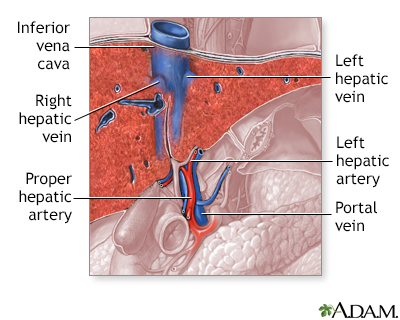Hepatic ischemia
Ischemic hepatitis; Shock liver
Hepatic ischemia is a condition in which the liver does not get enough blood or oxygen. This causes injury to liver cells.
Images

Causes
Low blood pressure from any condition can lead to hepatic ischemia. Such conditions may include:
- Abnormal heart rhythms
- Dehydration
- Heart failure
- Infection, especially sepsis
- Severe bleeding
Other causes may include:
- Blood clots in the main artery to the liver (hepatic artery) after a liver transplant
- Inflammation of blood vessels, leading to reduced blood flow (vasculitis)
- Burns
- Heat stroke
- Having a sickle cell crisis
Symptoms
The person may have altered mental status due to reduced blood flow to the brain. Other symptoms may include:
- Loss of appetite
- Feeling of general discomfort
- Jaundice
Damage to the liver cells most often does not cause symptoms until it affects liver function.
Blood clots in the liver's main artery may cause abdominal pain.
Exams and Tests
The following tests will be done:
- Blood tests to check liver function (AST and ALT). These readings can be very high (in the thousands) with ischemia.
- Doppler ultrasound of the blood vessels of the liver.
Treatment
Treatment depends on the cause. Low blood pressure and blood clots must be treated right away.
Outlook (Prognosis)
People generally recover if the illness causing hepatic ischemia can be treated. Death from liver failure due to hepatic ischemia is very rare.
Possible Complications
Liver failure is a rare, but fatal complication.
When to Contact a Medical Professional
Contact your health care provider right away if you have persistent weakness or symptoms of shock or dehydration.
Prevention
Quickly treating the causes of low blood pressure may prevent hepatic ischemia.
Related Information
Heart failureArrhythmias
References
Korenblat KM, Berk PD. Approach to the patient with jaundice or abnormal liver tests. In: Goldman L, Schafer AI, eds. Goldman-Cecil Medicine. 26th ed. Philadelphia, PA: Elsevier; 2020:chap 138.
Nery FG, Valla DC. Vascular diseases of the liver. In: Feldman M, Friedman LS, Brandt LJ, eds. Sleisenger and Fordtran's Gastrointestinal and Liver Disease. 11th ed. Philadelphia, PA: Elsevier; 2021:chap 85.
Williams MJ, Gordon-Walker TT. Hepatology. In: Penman ID, Ralston SH, Strachan MWJ, Hobson RP, eds. Davidson's Principles and Practice of Medicine. 24th ed. Philadelphia, PA: Elsevier; 2023:chap 24.
BACK TO TOPReview Date: 5/4/2022
Reviewed By: Michael M. Phillips, MD, Emeritus Professor of Medicine, The George Washington University School of Medicine, Washington, DC. Also reviewed by David C. Dugdale, MD, Medical Director, Brenda Conaway, Editorial Director, and the A.D.A.M. Editorial team.

Health Content Provider
06/01/2025
|
A.D.A.M., Inc. is accredited by URAC, for Health Content Provider (www.urac.org). URAC's accreditation program is an independent audit to verify that A.D.A.M. follows rigorous standards of quality and accountability. A.D.A.M. is among the first to achieve this important distinction for online health information and services. Learn more about A.D.A.M.'s editorial policy, editorial process and privacy policy. A.D.A.M. is also a founding member of Hi-Ethics. This site complied with the HONcode standard for trustworthy health information from 1995 to 2022, after which HON (Health On the Net, a not-for-profit organization that promoted transparent and reliable health information online) was discontinued. |
The information provided herein should not be used during any medical emergency or for the diagnosis or treatment of any medical condition. A licensed medical professional should be consulted for diagnosis and treatment of any and all medical conditions. Links to other sites are provided for information only -- they do not constitute endorsements of those other sites. © 1997- 2024 A.D.A.M., a business unit of Ebix, Inc. Any duplication or distribution of the information contained herein is strictly prohibited.
